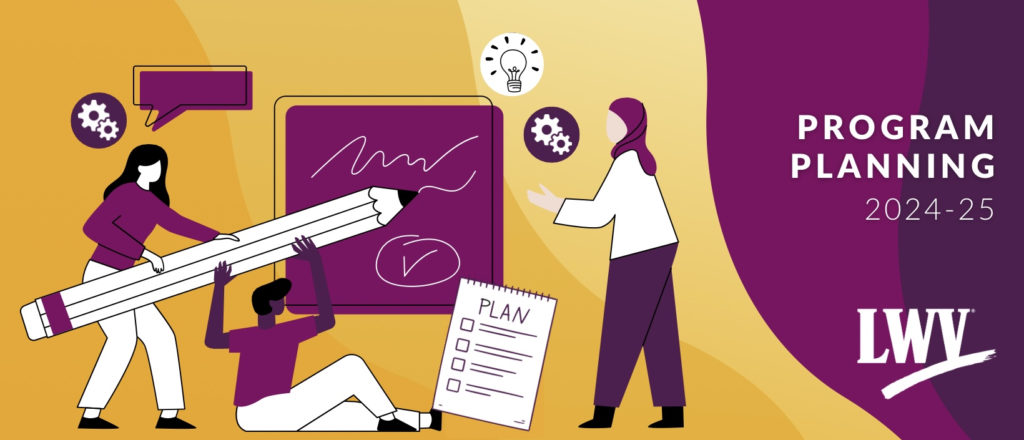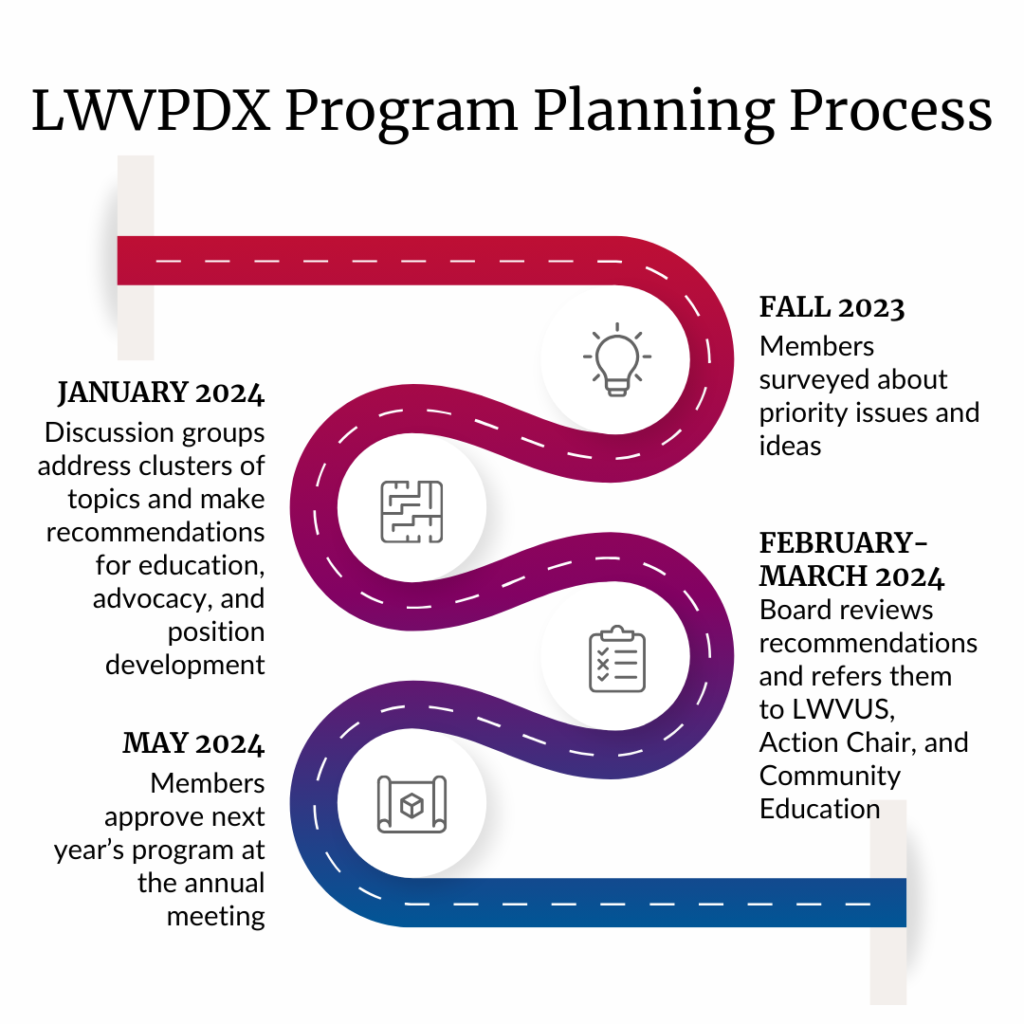
Being a member of the League offers you the opportunity to help shape the Leagues priorities. Through the Program Planning process, members talk about what they want to see in the year ahead:
- What we should be advocating about
- What we should be educating ourselves and the community about
- Where we should be focusing our energies to learn more.
The League is grassroots-powered by our members – you.
Program Planning Explained
(Click the > on the right to open each section.)
Purpose and Process
Program – those issues impacted by government and chosen by LWV members for concerted study and action.
PURPOSE
There are many important issues on which LWV could have an impact. During program planning, League members examine our advocacy positions to decide whether they are up-to-date and adequate for addressing the important issues our local, state and/or national governments will face in the year ahead. In addition, members suggest various ways the League can work on these issues.
In even years, we focus on local and national positions. In odd years we look at local and state positions.
PROCESS

Early Fall Preparations – Portland League members submit their responses to a survey about priority issues on local, state, and/or national levels resulting in seven issues organized into seven discussion groups.
December to January – Members register to attend one or more of the seven online discussion groups. Members may participate in as many of the discussion meetings as they like.
January – Members meet online to discuss one or more of the seven issues. These topics all have important implications for the future of our communities and country.
During discussions, attending members decide whether or not the League’s advocacy positions adequately address the issues. They also consider whether any positions need to be restudied. If no position covers an issue, members can propose a new study.
February to March – Recommendations resulting from the discussions are published in the Voter newsletter and sent to the LWVPDX Board and the LWVOR or LWVUS Board of Directors who recommend proposals they believe members should adopt.
May and/or June – League members or their delegates vote on the various proposals at the local annual meeting and at the state or national convention. The final decisions determine the programs for the following year.
Possible Recommendations
In addition to making recommendations about the advocacy positions and new studies, the discussion groups can propose various LWV activities. For example, they can propose topics for focused League advocacy, community education events, and interest groups. In January or February, Portland League members may also suggest Bylaw amendments and nominees for the LWVPDX Board.
Definitions for Program Planning Terms
ACTION: a continuous process of working toward goals stated in local, state, and national advocacy positions on public policy issues. Action may involve listening to presentations by public officials, interviewing or lobbying public officials, testifying at public hearings, organizing public forums, contacting the media, joining campaigns for issues we support, informing the public, monitoring governmental functions, and litigating. The Board approves League advocacy.
COMMUNITY EDUCATION: programs for members and the public with prominent speakers on current issues and on League studies. The Community Education Committee also is involved with discussion units, interest groups, study committees, and annual program planning.
CONCURRENCE: an agreement with the exact wording of a statement that may be a position held by another state or local League or a decision statement made by a League board or study committee. The membership must vote to approve a concurrence, before we can use it.
CONSENSUS: a process by which members discuss the findings of a completed study and answer questions developed by the study committee. Consensus reached by members through group discussion is not a simple majority, nor is it unanimity; rather it is the overall “sense of the group” as expressed through the exchange of ideas and opinions, whether in a membership meeting or a series of membership or unit meetings.
INTEREST GROUPS: small groups of members, interested in a topic related to a position, who gather for the purpose of collaborative learning. Interest groups must request and receive approval from the Board in order to function in the name of the League.
POSITION: a statement of the League’s point of view on an issue, derived through member study and agreement (consensus or concurrence) and approved by the appropriate board. Once approved, the position can be used as a basis for League action/advocacy on public policy issues and legislation that relate directly to the position. The LWVPDX can use LWVUS, LWVOR and LWVPDX positions to advocate on local issues.
PROGRAM: the League’s “reason for being,” the basis for both education and action efforts. It consists of those governmental issues that League members choose for concerted study and action, including both adopted positions upon which action is taken and issues for study that will lead to a position and action.
STUDY: extensive, in-depth, balanced research on a public policy issue in order to form a new advocacy position. Studies must be approved by the membership and are conducted by committees of interested members established with board approval. The committee gathers information obtained from researching public documents, conducting interviews with local officials and experts, and further fact-finding activities.
RECOMMENDATIONS ON POSITIONS TO CONSIDER DURING PROGRAM PLANNING:
● RETAIN means to keep a position as is, with no change.
● DROP means to remove the position completely from our list; discontinue advocacy. To reactivate requires a new study.
● UPDATE means to update information about the issues addressed by a position or to update wording to conform to current usage, without changing the basic position.
● RESTUDY means to undertake a review of the position to potentially change it.
● ACTION means to refer the position to the Action Committee for advocacy on the issues.
Online Discussion Schedule and Sets of Issues
To learn more about an issue after January 8th, click the Resources link in the groups below.
Register for one or more of the Program Planning Discussions.
All discussions are virtual and will be held over Zoom.

Group 1: Tuesday, January 16, 1 pm via Zoom
Lack of Affordable Housing for Low Income People
Discussion leaders: Nancy Donovan & Anne Davidson
Notetaker: Shelly Rosenberg
Resources for Group 1 discussion, click here.
Group 2: Thursday, January 18, 1 pm via Zoom
Portland’s New Government Structure
Discussion leaders: Debbie Aiona, Janice Thompson
and Wynne Furth
Resources for Group 2 discussions click here.
Group 3: Saturday, January 20, 10 am via Zoom
Mental/Behavioral Health & Addiction Treatment and Housing with Peer Management
Discussion leaders: Jason Renaud & Kathy Casto
Notetaker: Marsha Gulick
Resources for Group 3 discussions, click here.
Group 4: Monday, January 22, 10 am via Zoom
Climate Change and the Environment
Discussion leaders: Nora Terwilliger & Linda Mantel with Robin Tokmakian reporting on the COP 28
Notetaker: Julie Chapman
Resources for Group 4 discussions, click here.
Group 5: Wednesday, January 24, 1 pm via Zoom
Education
Discussion leaders: Fran Dyke & Tom Dyke
Notetaker: Mimi Alkire
Resources for Group 5 discussions, click here.
Group 6: Friday, January 26, 10 am via Zoom
Election Issues and Civic Education
Discussion leaders: Norman Turrill & Melanie Billings-Yun
Notetaker: Chris Cobey
Resources for Group 6 discussions, click here.
Group 7: Monday, January 29, 1 pm via Zoom
Humanitarian Crises and International Relations
Discussion leaders: Barbara Dudley & Barbara Byrd
Notetaker: Carol Penn
Resources for Group 7 discussions, click here.

